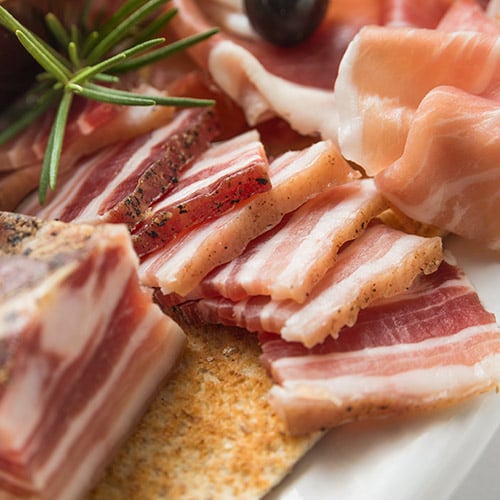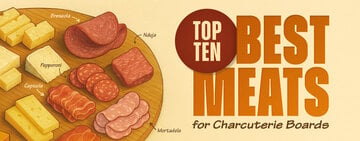While the modern, trendy charcuterie board has evolved to include everything from dessert to breakfast, traditional charcuterie describes the art of preparing cured meats and meat products. Even in light of loosely defined grazing boards, meats still play a central role in any charcuterie spread. We explore the top ten meats to include on your charcuterie board, offering customers a cultured selection of elevated options and familiar favorites. They come at varying price points, allowing you to formalize a menu that maximizes your profits. Shop All Charcuterie and Cured Meats Learn about the most popular charcuterie meats: 1. Prosciutto 2. Mortadella 3. Soppressata 4. Pepperoni 5. Nduja 6. Capicola 7. Summer Sausage 8. Bresaola 9. Jamon Iberico 10. Genoa Salami 1. Prosciutto Prosciutto is a renowned Italian dry-cured ham that has long been a staple on charcuterie boards. To create prosciutto, the pork legs are first salted to draw out moisture and enhance the meat's flavor. The meat is then air-dried for a period ranging between 9 and 18 months, depending on the desired intensity of flavor and texture. Prosciutto is characterized by its sweet and salty notes, complemented by subtle fruit and earth flavors. Prosciutto's melt-in-your-mouth texture and rich umami taste make it a favorite among charcuterie enthusiasts. When selecting prosciutto for your charcuterie board, opt for high-quality, DOP (Protected Designation of Origin) options like prosciutto di Parma to elevate the overall experience for your patrons. It is often enjoyed with sweet fruits like melon or figs, tangy cheeses such as Parmigiano-Reggiano, and briny olives. The salty richness of prosciutto also balances beautifully with the creaminess of fresh mozzarella or the earthy notes of mushrooms. Prosciutto Tasting Notes: Sweet, salty, earthy, subtly fruity Prosciutto Texture: Tender, silky, buttery Flavors that Complement Prosciutto: Melon, figs, Parmigiano-Reggiano, Pecorino Romano, mozzarella, olives, pickles 2. Mortadella Mortadella, a traditional Italian cured meat, is made from finely ground cooked pork. It is typically seasoned with spices such as black pepper, myrtle berries, and pistachios, giving it a distinct taste that sets it apart from other deli meats. Marbled with cubes of pork fat, mortadella is known for its smooth and tender texture. It has a mild and delicate flavor with a hint of sweetness. The pistachios add a subtle nuttiness that enhances the overall taste experience. To complement the flavors of mortadella, consider serving it with tangy pickles, such as cornichons or pickled onions, to add a contrasting acidity. A selection of olives can provide a salty element that balances the heaviness of the mortadella. Additionally, pairing mortadella with crusty bread or crackers allows for different texture contrasts that enhance the overall eating experience. Pistachios are a natural accompaniment, as are other types of nuts. Mortadella Tasting Notes: Savory, balanced, slightly sweet Mortadella Texture: Creamy, smooth Flavors that Complement Mortadella: Pickles, olives, crusty bread, pistachios, marcona almonds 3. Soppressata Soppressata is an Italian dry-cured salami made from coarsely ground pork. It's seasoned with a variety of spices, including black pepper, garlic, and sometimes red pepper flakes. The meat is typically stuffed into a natural casing and aged for several weeks to develop its distinct flavor. Known for its buttery, robust taste, soppressata offers a perfect balance of slightly spicy and tangy notes. Its texture is tender and slightly fatty, making it a delightful addition to any charcuterie spread. When selecting flavors to complement soppressata, consider pairing it with sharp cheeses like aged cheddar or Parmigiano-Reggiano. The salty and savory characteristics of soppressata also pair beautifully with sweet and tangy elements such as fig jam, honey, or balsamic glaze. Additionally, the subtle heat from the salami can be balanced with the freshness of sliced fruits like apples or pears. By combining these flavors, you can create a well-rounded charcuterie board that highlights the unique taste of soppressata. Soppressata Tasting Notes: Fatty pork, salty, slightly spicy Soppressata Texture: Coarse, chewy, dense Flavors that Complement Soppressata: Aged cheddar, Parmigiano-Reggiano, fig jam, honey, balsamic glaze, apples, pears 4. Pepperoni Pepperoni is a popular and versatile cured meat that adds a spicy kick to charcuterie boards. It is typically made from a mixture of pork and beef, seasoned with a blend of spices such as paprika, garlic, and chili pepper. The meat is finely ground and then undergoes fermentation, giving it a tangy flavor profile. Pepperoni has a bold and slightly spicy taste, with a hint of smokiness from the curing process. Its texture is firm and slightly chewy, making it a satisfying addition to any meat and cheese platter. When creating a charcuterie board featuring pepperoni, consider pairing it with complementary flavors to enhance the overall taste experience. Some flavors that work well with pepperoni include sharp and tangy cheeses like aged cheddar or Gouda, fruits such as figs or grapes, and pickles. Briny olive varieties such as black olives, Kalamata olives, and Castelvetrano olives complement pepperoni beautifully. Pepperoni Tasting Notes: Spicy, tangy Pepperoni Texture: Firm, slightly chewy Flavors that Complement Pepperoni: Aged cheddar, Gouda, figs, grapes, pickles, olive varieties 5. Nduja Nduja, pronounced as en-DOO-yah, is a spicy, spreadable pork salumi that originates from Calabria, Italy. This unique charcuterie ingredient is made by mixing ground pork with Calabrian chili peppers, salt, and various spices. The mixture is then aged for several weeks to develop its intense flavor profile. Nduja is known for its luxurious, spicy, and meaty taste. The combination of the fatty pork and the heat from the chili peppers creates a bold and complex flavor that is sure to stand out on any charcuterie board. When it comes to pairing flavors with nduja, there are several options that can enhance its taste. The texture of nduja is smooth and creamy, making it easy to spread on crackers or bread. Its buttery texture can also be complemented by the crunch of toasted nuts or the sweetness of different types of honey. Nduja's fatty, spicy profile pairs well with tangy and acidic ingredients like pickled vegetables or olives. Additionally, serving nduja with a mild cheese like mozzarella or a tangy cheese like pecorino can help balance out the salumi's spiciness. Nduja Tasting Notes: Buttery, spicy, meaty Nduja Texture: Smooth, spreadable Flavors that Complement Nduja: Crackers, crusty bread, toasted nuts, honey, pickled vegetables, olives, mozzarella, pecorino 6. Capicola Capicola, also known as coppa, is a traditional Italian cured ham variety that is a popular choice for charcuterie boards. Known to many Americans "gabagool", coppa is made from pork shoulder or neck that is seasoned with a blend of spices such as paprika, garlic, and black pepper before being cured and aged. It has a indulgent and umami flavor profile with a combination of sweet, spicy, and salty notes. The meat is marbled with fat, which gives it a tender and melt-in-your-mouth texture. Capicola is typically sliced thinly, making it easy to enjoy its complex flavors. When assembling a charcuterie board, capicola pairs well with a variety of flavors. Its slightly spicy and salty taste complements the sweetness of fruits like figs and melon. The fat content of capicola is balanced by the tanginess of pickles or olives. Additionally, serving capicola with creamy cheeses such as brie or goat cheese can create a delicious contrast of textures and flavors. Capicola Tasting Notes: Sweet, spicy, salty, garlicky, oily Capicola Texture: Tender, melt-in-your-mouth Flavors that Complement Capicola: Brie, goat cheese, figs, melon, pickles, olives 7. Summer Sausage Summer sausage is a cured sausage typically made from a blend of pork and beef, seasoned with a mix of spices such as garlic, mustard seeds, and black pepper. It is then smoked and fermented. Summer sausage has a robust flavor with a hint of tanginess from the fermentation process. Its texture is firm and slightly dry, making it easy to slice thinly for serving on a charcuterie board. When featuring summer sausage on a charcuterie board, consider pairing it with complementary flavors to enhance its taste. Some popular accompaniments include sharp cheeses like cheddar or Gouda, pungent mustards, sweet and tangy types of pickles, and crusty bread, pretzel bites, or crackers. The sharpness of the cheese and the acidity of the pickles help balance the richness of the sausage, while the mustard adds a zesty kick to each bite. Given its flavor profile and natural pairings, summer sausage lends itself perfectly to Oktoberfest charcuterie boards. Summer Sausage Tasting Notes: Smoky, tangy, slightly spicy Summer Sausage Texture: Firm, sliceable, chewy Flavors that Complement Summer Sausage: Cheddar, Gouda, mustards, pickles, crusty breads, pretzel bites 8. Bresaola Bresaola is a popular Italian cured meat known for its rich flavor with hints of sweetness and a subtle earthiness. This dry-aged beef is typically made from lean cuts of beef that are seasoned with a blend of salt and spices before being cured for several weeks to develop its distinct taste. The aging process gives bresaola a tender and delicate texture that melts in your mouth, making it a delightful addition to any charcuterie spread. The mild and slightly nutty flavor of bresaola pairs well with creamy cheeses like goat cheese or gorgonzola that balance out the saltiness of the meat. Adding a drizzle of high-quality extra virgin olive oil and a sprinkle of fresh herbs like thyme or rosemary can elevate the flavors of bresaola even further. To complement the savory notes of bresaola, consider adding sweet and tangy elements such as figs, grapes, or sliced apples for a refreshing contrast. Pickled vegetables like cornichons or pickled onions can add a zesty kick that enhances the overall flavor profile of the meat. Bresaola Tasting Notes: Earthy, subtly sweet Bresaola Texture: Delicate, melt-in-your-mouth Flavors that Complement Bresaola: Goat cheese, gorgonzola, olive oil, fresh herbs, figs, grapes, apple slices, pickled vegetables 9. Jamon Iberico Jamon Iberico is a premium Spanish cured ham that is highly prized for its exceptional quality and rich flavor profile. As one of the most expensive global foods, this gourmet meat comes from Iberian pigs that are raised in Spain and fed a diet of acorns, which gives it its complex flavor profile that includes hints of nuttiness, sweetness, and a subtle saltiness. Jamon Iberico is known for its melt-in-your-mouth texture and intense, meat flavor. The meat is marbled with flavorful fat that adds a luxurious mouthfeel and depth of flavor. To complement the bold flavor of jamon Iberico, it is best paired with sweet and tangy fruits like figs or melon, which provide a refreshing contrast to the rich meat. Additionally, serving jamon Iberico with crusty bread and a drizzle of high-quality extra virgin olive oil (EVOO) can further enhance its flavors and create a satisfying bite. Overall, jamon Iberico is a luxurious addition to any tapas menu. Jamon Iberico Tasting Notes: Nutty, sweet, salty Jamon Iberico Texture: Buttery, tender Flavors that Complement Jamon Iberico: Melon, fig, crusty bread, EVOO 10. Genoa Salami Genoa salami is a popular dry-cured Italian sausage that is a staple on charcuterie boards and antipasto platters. This type of sausage is named after the city of Genoa in Italy and is typically made from a blend of pork, salt, garlic, pepper, and red wine, which gives it a unique taste that is slightly spicy and tangy. It has a rich, meaty flavor with a hint of garlic and a pleasant balance of saltiness and sweetness. The texture of Genoa salami is firm and slightly chewy, making it easy to slice thinly for serving. When it comes to pairing flavors with Genoa salami, there are several options that complement its bold taste. Cheeses such as sharp cheddar, creamy brie, or tangy blue cheese are excellent choices to balance the saltiness of the salami. Fruits like figs, grapes, and sliced apples add a touch of sweetness that enhances the savory flavors of the salami. Olives, pickles, and mustard are also great accompaniments that provide a contrast in texture and flavor. Genoa Salami Tasting Notes: Slightly spicy, tangy, garlicky Genoa Salami Texture: Firm, slightly chewy Flavors that Complement Genoa Salami: Cheddar, brie, blue cheese, figs, grapes, sliced apples, olives, pickles, mustard Back to Top Charcuterie Meat Brands If you are aiming to incorporate charcuterie boards into your menu or are in search of superior quality compared to your current suppliers, it is crucial to be informed about the leading charcuterie meat brands. We have curated a selection of top-rated brands that operators should familiarize themselves with to ensure the highest quality products for their establishments. Tanara Giancarlo Foods Founded in 1960, Tanara Giancarlo Foods has a rich history of crafting exceptional charcuterie and DOP Parma ham. Located in the picturesque town of Langhirano, Italy, surrounded by lush hills and historic castles, the company benefits from the region's unique climate. The salty sea air from the Apennine mountains transforms into a cool and sweet breeze that gently flows into Tanara Giancarlo's curing rooms. This traditional curing process, which has been practiced for centuries, is faithfully maintained by Tanara Giancarlo Foods, ensuring the continuation of this time-honored legacy. Average Price Point: $2.27 per ounce Types: Prosciutto di Parma See what our customers are saying about Tanara Giancarlo Foods here! Don Juan Food Products Don Juan Food Products is a renowned brand in the world of charcuterie meats, honoring the legacy of traditional Spanish delicacies through their exceptional products. With a commitment to time-honored methods, Don Juan Food Products creates a range of charcuterie meats that are reminiscent of the terroir of the Spanish countryside. Their dedication to quality and authenticity shines through in every slice, making them a top choice for commercial establishments looking to elevate their charcuterie offerings. Average Price Point: $1.06 per ounce Types: Dry-aged jamon serrano, 3-year dry-uncured Iberico salchichon salami See what our customers are saying about Don Juan Food Products here! Shaffer Venison Farms Shaffer Venison Farms is a family-owned meatpacking company based in central Pennsylvania. Founded in 2000, this brand has quickly gained recognition for its commitment to providing high-quality venison products free from growth hormones and chemicals. Unlike wild-caught venison, Shaffer Venison Farms' products are known for their superior taste and texture. Their products lack the toughness or gaminess that can sometimes be associated with wild game meats, making them a popular choice for those seeking a more refined and consistent flavor profile. With farm-fresh roots and a focus on quality, Shaffer Venison Farms continues to be a trusted source for premium charcuterie meats. Average Price Point: $0.89 per ounce Flavors: Venison summer sausage, wild boar summer sausage, venison cheddar summer sausage, venison ring bologna See what our customers are saying about Shaffer Venison Farms here! Fontana Ermes Fontana Ermes is a notable name in the world of charcuterie, known for its first-class offerings and commitment to quality. With a legacy spanning three generations, Fontana Ermes has established itself as a premier producer of cured meats, particularly its renowned DOP Prosciutto di Parma. Operating from a state-of-the-art facility, Fontana Ermes upholds a deep respect for the centuries-old traditions of Italian culinary history. This dedication to tradition and quality is evident in the exceptional taste and texture of their products, making them a top choice for chefs and charcuterie enthusiasts worldwide. Average Price Point: $7.40 per ounce Types: Prosciutto di Parma, prosciutto crudo See what our customers are saying about Fontana Ermes here! Disclaimer: The average price point is determined at the time of publication. Check product pages for current prices. Back to Top Elevate your menu with a carefully curated charcuterie board featuring the best meats available. From prosciutto and salami to venison summer sausage, the options are endless for creating a delicious and visually appealing spread. Consider including a charcuterie board at your wedding or special event for a sophisticated touch that will delight your attendees. For more inspiration on how to set the entire aesthetic tone of your event, be sure to check out our style guides for expert tips and ideas for creating classic chic, vineyard, and boho events.





